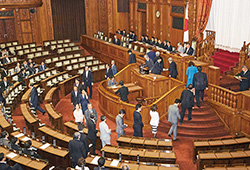
Bills to enhance Japan's legal framework for peace and security were passed in a plenary session of the House of Councillors on September 19 by a majority vote, led by members of the LDP. The legislation will put into place a seamless framework able to respond to all circumstances and protect the peace and lives of the Japanese people in a drastically changing international environment. The new laws will allow Japan to maintain and strengthen the deterrent force that prevents disputes and take a strong step forward as a country of peace.
There were two specific pieces of legislation passed. The "Bill to Enhance the Legal Framework for Peace and Security" bundles together bills amending a total of 10 laws, including the Self-Defense Forces Act and the International Peace Cooperation Act, while the "International Peace Support Law" is a new law. Highlights of the legislation include the exercise of the right of collective self-defense in restricted circumstances, expansion and acceleration of logistical support provided to the military forces of other countries, expanded participation in UN peacekeeping operations (PKO) and other international contributions, and faster deployment of security forces to outlying islands.
The legislation was deliberated carefully by the special committees on security legislation in both the upper and lower houses. In total, the House of Representatives spent 116 hours and the House of Councillors spent more than 100 hours deliberating the bills, including intensive deliberation with Prime Minister Shinzo Abe in attendance.
During the deliberations, Prime Minister Abe argued that there have been fundamental changes in Japan's security environment and that the legislation was necessary to respond to them. He also explained in great detail that the limited allowance for exercise of the right of collective self-defense was constitutional and that there were strict restrictions on the exercise of force and provision of logistical support, specifically the "Three New Conditions" and "Diet approval."
During the final phase of the House of Councillors deliberations, the LDP and Komeito joined with three opposition parties, Party for Future Generations, The Assembly to Energize Japan, and the New Renaissance Party, to reach a consensus to treat expanded Diet involvement in decisions to dispatch Self-Defense Forces overseas as a matter requiring a supplementary resolution and cabinet decision.
The bills were adopted by the House of Councillors special committee on September 17 and by the plenary session on the 19th. Opposition parties resisted and a total of six motions of no-confidence, dismissal, and censure were submitted against Special Committee Chairman Yoshitada Konoike and other leaders. A no-confidence motion against the cabinet was also submitted in the House of Representatives. After rejecting all of these motions, the legislation was passed by a majority vote, support coming from the LDP, Komeito, the Party for Future Generations, The Assembly to Energize Japan, and the New Renaissance Party.










